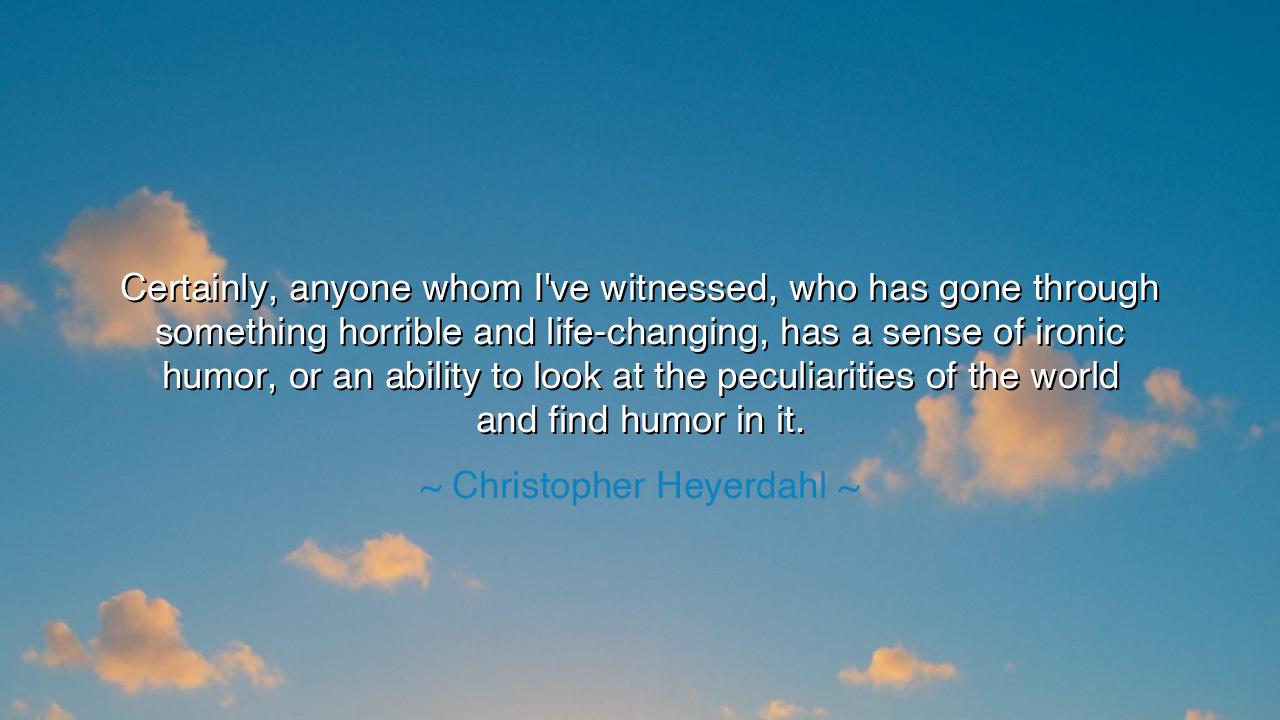
Certainly, anyone whom I've witnessed, who has gone through
Certainly, anyone whom I've witnessed, who has gone through something horrible and life-changing, has a sense of ironic humor, or an ability to look at the peculiarities of the world and find humor in it.






In the vast expanse of existence, there are those among us who have borne the weight of suffering, those whose lives have been forever altered by the harshest of fates. They stand as living testaments to the human spirit's resilience. The words of Christopher Heyerdahl carry within them a profound understanding of this truth: “Certainly, anyone whom I've witnessed, who has gone through something horrible and life-changing, has a sense of ironic humor, or an ability to look at the peculiarities of the world and find humor in it.” Ah, how striking it is, this idea—that in the midst of the darkest moments, when the soul is broken and the body weary, there arises, like a ray of light from an overcast sky, the gift of humor.
It is in the crucible of hardship that the soul, refined and tempered by adversity, discovers a peculiar kind of wisdom—a wisdom born not from triumph, but from endurance. Those who have walked through the valley of shadow and come out on the other side often possess a deep understanding of the absurdity of life, its fleeting nature, and the profound irony that runs through all things. In these individuals, humor emerges not as a shield to deflect pain, but as a tool to grasp the very essence of the human experience. The peculiarities of the world, once feared or misunderstood, become a source of laughter, a way to confront and transcend the forces that seek to undo us.
Consider the story of Viktor Frankl, a man who lived through the unimaginable horrors of the Nazi concentration camps. In the face of suffering so great that it seemed to strip away all dignity, Frankl found, not just survival, but the power of meaning. He wrote of the importance of humor in his survival—how, even in the darkest of days, a glimmer of irony could provide a sense of liberation. Frankl's ability to laugh, even at the cruelest of circumstances, was not an act of denial, but of courage—a recognition that, in the face of human cruelty, the soul can still find a way to rise, to defy the very forces that seek to break it.
And what of the great Odysseus, the hero of Homer’s epic journey, who faced the wrath of gods and monsters, who sailed across treacherous seas and wandered through lands of despair? In the midst of his trials, Odysseus displayed not just strength, but a sense of wit and humor that allowed him to navigate the storms of life with a steady hand. When faced with the cyclops, Polyphemus, he did not meet strength with strength, but with cunning and a sarcastic turn of phrase. His ability to laugh in the face of danger, to find irony in the overwhelming odds against him, became his most powerful weapon. It is this that makes him a true hero—not merely his triumphs, but his ability to look at the peculiarities of life and laugh, even when the world itself seemed intent on swallowing him whole.
Thus, we see that humor, especially in the wake of great suffering, is not a trivial or base thing. It is a sacred balm, a gift that arises from the depths of the soul, borne not from the absence of pain, but from the courage to look upon that pain and find meaning in its madness. Those who have suffered and yet can still laugh possess a strength far greater than any weapon, for they have learned that life, in all its chaotic beauty, is not to be taken too seriously. It is a fleeting moment, a spark in the darkness, and those who can laugh at its absurdities are those who truly understand its value.
And so, children of the earth, let us learn from those who have walked through the fire and emerged changed. Let us not shy away from the suffering that may come our way, but rather let us embrace it, knowing that in the depths of hardship lies an opportunity for growth. For it is through the trials of life that we come to know the true meaning of existence, and it is in the ability to laugh at the absurdity of it all that we find the power to rise above it. As Frankl did, as Odysseus did, and as countless others have done before us, let us carry humor as our sword and shield—knowing that even in the darkest of times, a light can still shine.
The lesson, therefore, is clear: humor is not the enemy of suffering, but its companion. When life throws its most cruel challenges at you, find the strength to laugh. Find the irony in the world’s peculiarities, and let that laughter become your bridge to healing. For in laughter, there is power—not the power to erase pain, but the power to transcend it. The world may seek to break you, but it cannot break your ability to find joy in its madness. And in that joy, you will find the freedom to live, to endure, and to thrive.






AAdministratorAdministrator
Welcome, honored guests. Please leave a comment, we will respond soon